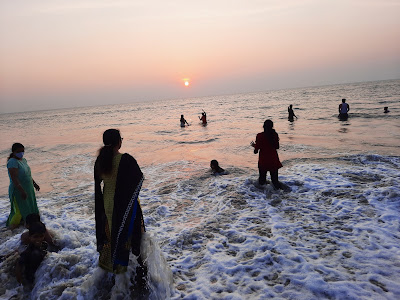 |
| Cherai Beach, Kochi |
The beach is one of the
loveliest places on earth. I can spend hours sitting on the sand and looking at
the restless sea. The waves. What are they hungry for? They never rest. You can
watch a wave coming from far away in the sea and moving relentlessly, on and
on, until it lashes against the shore and returns. And returns. It is an
endless process. A process that started somewhere beyond the reach of your
vision. Your vision ends where they call the horizon. But you know that the
horizon is not the end. It is the beginning, in fact, the beginning of another
world.
Another world
from where Vasco da Gama was carried by the restless waves to Kerala many
centuries ago carrying the Portuguese colonial power in a few ships. The tang
of pepper and cinnamon on the beaches of Calicut beckoned Vasco and his crew
like the sirens on the enchanted island of Odyssey. Vasco came, Vasco
saw, Vasco conquered. The legacy left by him five centuries ago has survived to
this day in Kerala.
The seas have
carried colonial powers all over the world. Christopher Columbus was one of the
many carriers of that power. His legacy was far more brutal than Vasco da
Gama’s. Other people existed only for gratifying his appetites, Columbus
thought. He could just take a woman from an island and give her to his crew members for sex. He cut off a man’s
ears merely to shock the other people of the island into submission. Columbus
was a mass murderer. He killed those who refused to submit themselves to his
power. He was a tyrant and a scoundrel. His legacy has continued to govern the
United States of America to this day. They call it civilisation.
Such is the
hunger of the oceans. It is a human hunger. Or is it inhuman?
I live in
Kerala which has a 600-kilometre-long coastline. So many civilisations entered
Kerala along that coastline at various junctures of history: Dutch, French, Arab,
and even the ancient Roman. Legend has it that Thomas, disciple of Jesus,
landed in Kerala along with traders in the first century CE. It is true that
the Roman Empire had trade relations with South India from the time of Augustus
Caesar (c 40 BCE). The Roman aristocracy loved the exotic things of the East.
Pliny the Elder ridiculed Emperor Nero for burning more perfumes on the single
day of the funeral of his queen Poppaea than what Arabia could produce in a
whole year. The fountains of the affluent Romans flowed with rosewater. All
those perfumes, spices and condiments were carried across the oceans.
The British Empire
came across the oceans too. Carrying the white man’s burden. Another hunger of
the oceans.
Sitting on
the golden sands by the Arabian Ocean, I can see the shadows of alien ships
beyond the grey horizon and its scarlet twilight.
The ships
have become shadows. But the restlessness of the seas continues. Only, now the
restlessness comes from a landlocked city. And the war cries are indigenous.
They don’t belong to alien ships.
PS. I'm
participating in #BlogchatterA2Z
Previous
Post: Nationalism
is a drug
Tomorrow:
Paradises Lost
When I read this question in the second line of this post: "What are they hungry for?" I mistook it for the hunger of nature. By the end of the post I stand corrected.
ReplyDeleteFantastic post.
The beach is a good place for contemplation. Nature's hunger metamorphoses...
DeleteYou're lucky to live in Kerala.
ReplyDeleteThe restless ocean is a fascinating subject and you have done justice to it.
As you put it so succintly, ' You can watch a wave coming from far away in the sea and moving relentlessly, on and on, until it lashes against the shore and returns. And returns.'
Glad you liked it.
DeleteI first thought it is a simple post on ocean and waves and wondered how come !?
ReplyDeleteThen as I read through got ur msg. the war cries are indigenous. They don’t belong to alien ships. -- Wonderfully concluded
I wish I didn't have to go into the war cries of the waves and could stick to the obvious charms of the waves.
DeleteYou have beautifully rendered your spontaneous thoughts. Enjoyed every line.
ReplyDeleteI have never been to deep seas. But have heard my brother who often has to be on oil barges that sea is calm as long as it is. And when it decides otherwise nothing can stop it in its way, nothing has chance to withstand its fury. I wonder if it is this thread of similarity that ties the oceans and the deepest desires of man's heart, together.
ReplyDelete-Anagha Yatin
https://canvaswithrainbow.com/
The sea has infinite moods. Like human emotions and cravings.
DeleteHari OM
ReplyDeleteTo sit by the ocean is to be humbled by its power - and to discover that it laps all of history into its folds. Just as the waves seperate then return to the whole, so do all our tales... and sometimes there are storms. YAM xx
O=Orb
Indeed. The sea has much to offer. Some of it is intimidating too.
DeleteThis post was a revelation in many ways. So many things out there that I was unaware of. I love the waters too. Even the mountains. Both leave me feeling miniscule, a mere speck.
ReplyDeleteThere was more I wanted to add but restrained myself.
DeleteThe ocean truly is endless and has so many mysteries. Good post.
ReplyDeleteThank you.
DeleteWhenever I sit at beach, this question always cross my mind, why waves are never tired of returning? The infinite ocean and endless mysteries locked in it.
ReplyDeleteInteresting post - civilisations, columbus and correlation of crazy waves and crazier humans.
The waves cannot afford to retire. They are like human civilisations.
DeleteI have been to Cherai as a child and there's nothing more beautiful
ReplyDeleteYes, that's a lovely beach.
DeleteVery nicely written
ReplyDelete